Lepidico (LPD) - Financing is the Final Hurdle for Robust Lithium Project

Interview with Joe Walsh, MD of Lepidico (ASX:LPD)
Lepidico Ltd. is a lithium exploration and development company, with offices in both Perth and Toronto. The company is listed on the ASX as well as various German stock exchanges. Lepidico Ltd. aims to become a vertically integrated business from mining at its 80% owned Karibib project in Namibia to the production of battery-grade lithium chemicals at its Phase 1 chemical plant in Abu Dhabi. The company implements its L-Max and LOH-Max process technologies to extract lithium and various other valuable by-products from lithium-mica and phosphate minerals.
The company at the end of January 2023 published its quarterly activities report for Q4 2022. The report includes highlights such as the economics of the Phase 1 chemical plant being updated and improved by the company. The updated economics show an NPV8% of 530 million and an IRR of 42%, in contrast with the economics of the project in 2020 which had an NPV8% of 221 million and an IRR of 31%. The project's front-end engineering design (FEED) works have been completed with the EPCM works commencing in December 2022. The first lithium chemical production is scheduled to occur in H2 2025.
The review of the control estimates and schedules for the phase 1 development of the Karibib project has been completed with the technical due diligence set to be concluded in February 2023 by an independent engineer. The completion of the technical due diligence closes out the body of work required by the Development Finance Corp (DFC) bringing the company closer to receiving the necessary funds to advance the project. The legal due diligence for the project’s funding has also been initiated, with the preferred legal counsel of the DFC appointed by Lepidico Ltd.
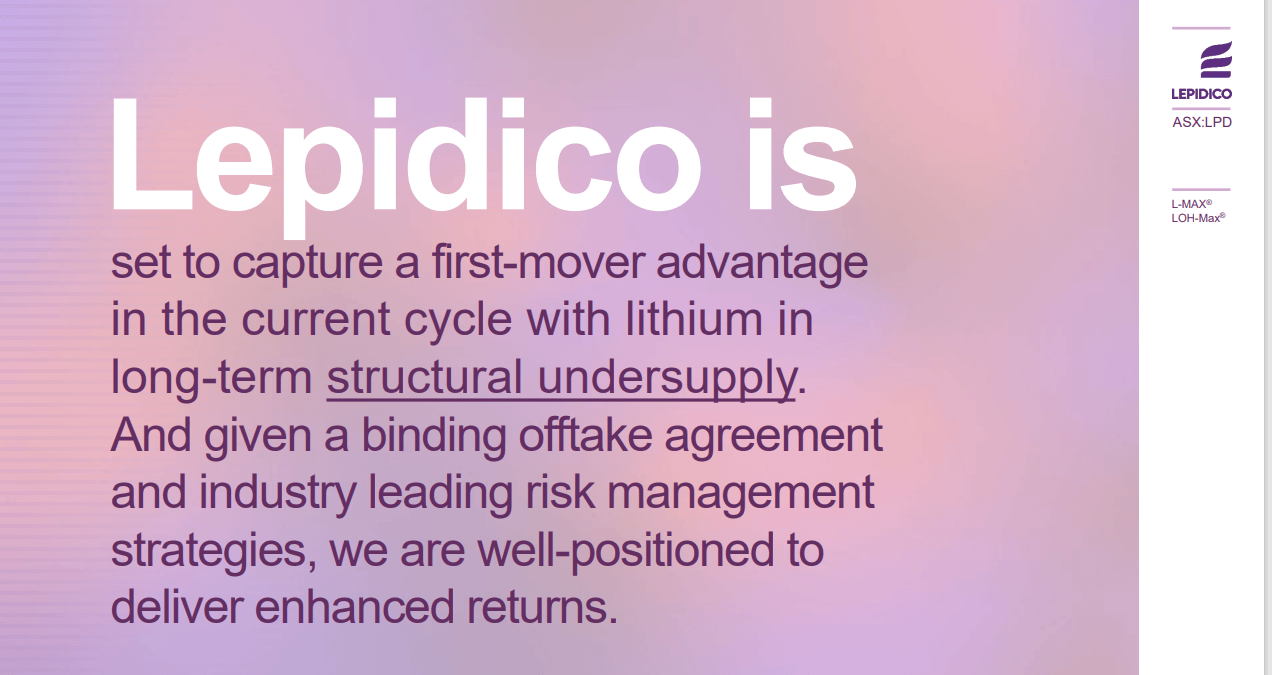
Phase 1 project, L-Max and LOH-Max technologies
The L-Max and LOH-Max technologies are patent-protected hydrometallurgical technologies aimed at producing lithium and lithium hydroxide respectively as well as various other by-products.
The L-Max technology of the company consists of the creation of mica concentrate through a basic flotation circuit. Lithium Mica is a basic potassium and lithium aluminosilicate and is the most common form of lithium mineralisation. The concentrate is subjected to a leaching circuit in which the concentrate is treated with sulphuric acid, resulting in a lithium solution hosting lithium salts. The soluble lithium salts are then selectively precipitated creating a lithium sulphate compound. The L-Max technology is a low-cost and low-energy process using commonly available reagents namely sulphuric acid and calcium hydroxide, commonly referred to as lime. The technology also produces silica, potassium sulphate, a fertiliser, caesium, rubidium and a gypsum-rich residue product.
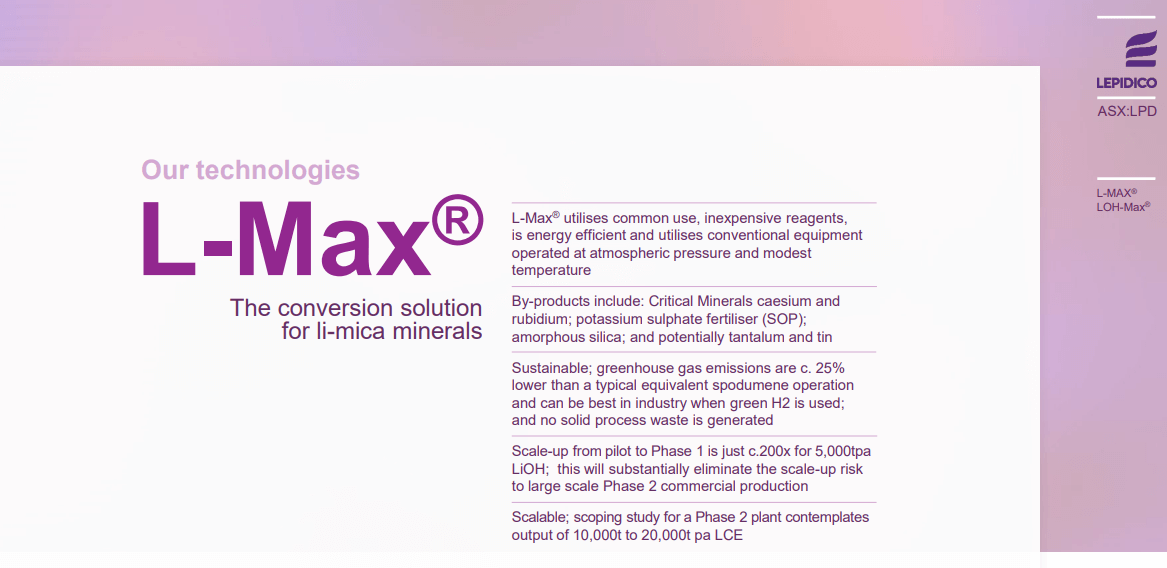
The LOH-Max technology of the company produces high-quality lithium hydroxide from lithium sulphate. The LOH-Max technology is an attractive option for the production of lithium hydroxide due to its low capital and operating costs as well as the technology not producing sodium sulphate, the disposal of which is a challenge for the lithium and lithium-ion battery industries. The technology can produce lithium concentrates from hard rock such as spodumene and sedimentary hosted deposits.

The Phase 1 project of the company is an envisioned vertically integrated processing facility planned to be located within the KEZAD industrial park in the United Arab Emirates. The plant will process Lepidolite concentrate which is planned to be produced and shipped from Namibia through the implementation of the company’s L-Max and LOH-Max technologies. The plant is planned to have a 6.9 tons per hour capacity, which will be able to produce 5,600 tons per annum (tpa) of product, including between 4,00 and 5,000 tpa of lithium hydroxide and various other by-products.
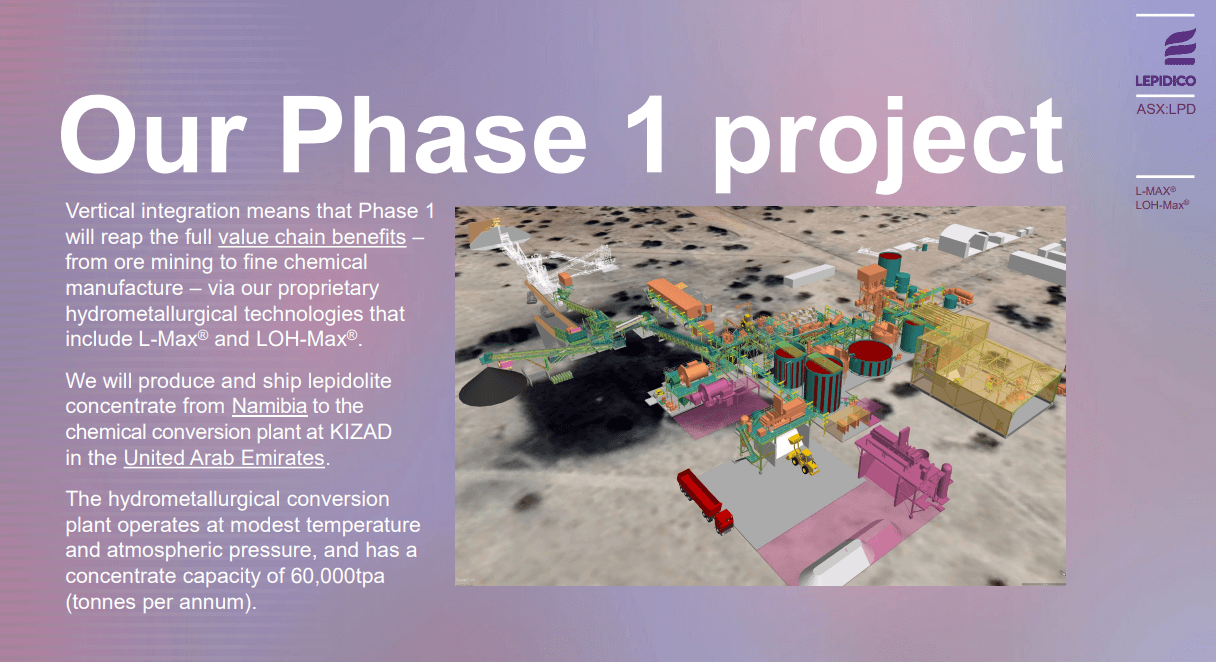
Work conducted in 2022
The company at the end of January 2023 published its quarterly activities report for Q4 2022. The report includes highlights such as the economics of the Phase 1 chemical plant being updated and improved by the company. The updated economics show an NPV8% of 530 million and an IRR of 42%, in contrast with the economics of the project in 2020 which had an NPV8% of 221 million and an IRR of 31%. The project's front-end engineering design (FEED) works have been completed with the EPCM works commencing in December 2022. The first lithium chemical production is scheduled to occur in H2 2025. Joe Walsh, Managing Director of Lepidico Ltd. explains that the company was able to reach various milestones in 2022.
“I think that we've really progressed the project and the business. We've undertaken a significant de-risking of the project. We completed front-end engineering and design for both the upstream concentrator and the downstream chemical plant. There's 18 months of work right there. That body of work was completed in November and it gave us updated capital cost estimates and delivery schedules for both plants.”
The review of the control estimates and schedules for the phase 1 development of the Karibib project has been completed with the technical due diligence set to be concluded in February 2023 by an independent engineer.
“That demonstration plant that we ran last year as well, all of the results that came out of that have been extensively due diligence’d now by Beta Bear Australia, a very credible group, that is doing the technical due diligence for the US Government's International Development Finance Corporation.”
The company has been able to de-risk the envisioned Phase 1 project to have a contingency level of between 9.3% and 9.4%, according to Walsh.
“One of the things that I thought was really telling was that after reviewing all of our latest estimates, they opined that for a project at our stage, which is very advanced, the contingency should be between 5%-10%. We're at 9.3%-9.4%, so at the upper end of that range. I'm comfortable that there's a degree of conservatism in these numbers, and they are current.”
The completion of the technical due diligence closes out the body of work required by the Development Finance Corp (DFC) bringing the company closer to receiving the necessary funds to advance the project. The legal due diligence for the project’s funding has also been initiated, with the preferred legal counsel of the DFC appointed by Lepidico Ltd. Walsh explains that the company fits the criteria necessary to receive the funds from the DFC and that the appointment of legal counsel indicates that the company is in the final phases of receiving the funds.
“We're very consistent in our approach that the US Government's International Development Finance Corporation is mandated to be able to lend to projects in developing countries. Namibia obviously fits in that category. We've been working with DFC now for over 2 years, and it's an exhaustive comprehensive process. You've got to jump through all sorts of hoops on the environmental and social side, technical and economic. We've been through all of that. At the beginning of this year, they appointed legal counsel, which puts us on the home straight.”
Funding
The funding from the DFC will be approximately USD$ 50 million according to Walsh, with the Karibib project having an estimated CAPEX of USD$ 63 million. The Phase 1 project of the company is envisioned to have a USD$ 200 million capital cost.
“In Namibia, the CAPEX there is about USD$ 63 million. The indications are that DFC will be there for up to around USD$ 50 million, and they can actually lend that amount without going to their own board for approval. That streamlines that process.”
The DFC will however not be able to fund the necessary USD$ 200 million required for the Phase 1 project of the company, due to its location being in the UAE, a developed economy.
The remaining funds required for the capital as well as the operating costs will be obtained by the company through possible strategic investments by institutions who are looking to enter the lithium space.
“Being in the UAE and Abu Dhabi, we are seeing an enormous increase in interest in that part of the world. Literally in the last 3 to 4 months, we're seeing for the first time, battery manufacturers and cathode manufacturers that are seriously looking at joint ventures within the UAE. Our lithium is going to be the only supplier in the region at this point in time, and it's a critical component of that supply chain. I think it's an incredibly attractive place to be doing business.”
Lepidico Ltd. may also look at sourcing funding from traditional commercial lenders such as European lenders familiar with the lithium space as well as regional lenders within the UAE. The company may also look at further licensing agreements with various partners regarding its L-Max and LOH-Max patented technologies.

Timing the market and company value
Lepidico Ltd. is focused on advancing its Phase 1 project to production in the coming year, with Walsh noting that the company has seen an increase in demand and believes that through it being fully permitted, it will be able to capitalise on the developing market conditions.
“I think you just have to run as hard as you can and push as hard as you can, and we're exactly doing that. I don't think we hope for the best. I firmly believe in the fundamentals here. We are seeing this very dramatic growth in demand. I think we all know how difficult the minerals industry is, and the chemicals industry, to bring new projects on, and it invariably takes longer. We're fully permitted. How many projects are still trying to get over that hurdle?”
According to Walsh, Lepidico Ltd. is still valued as a developer, he however, believes that as the company obtains the required financing and delivers its required milestones, the company should experience a re-rate.
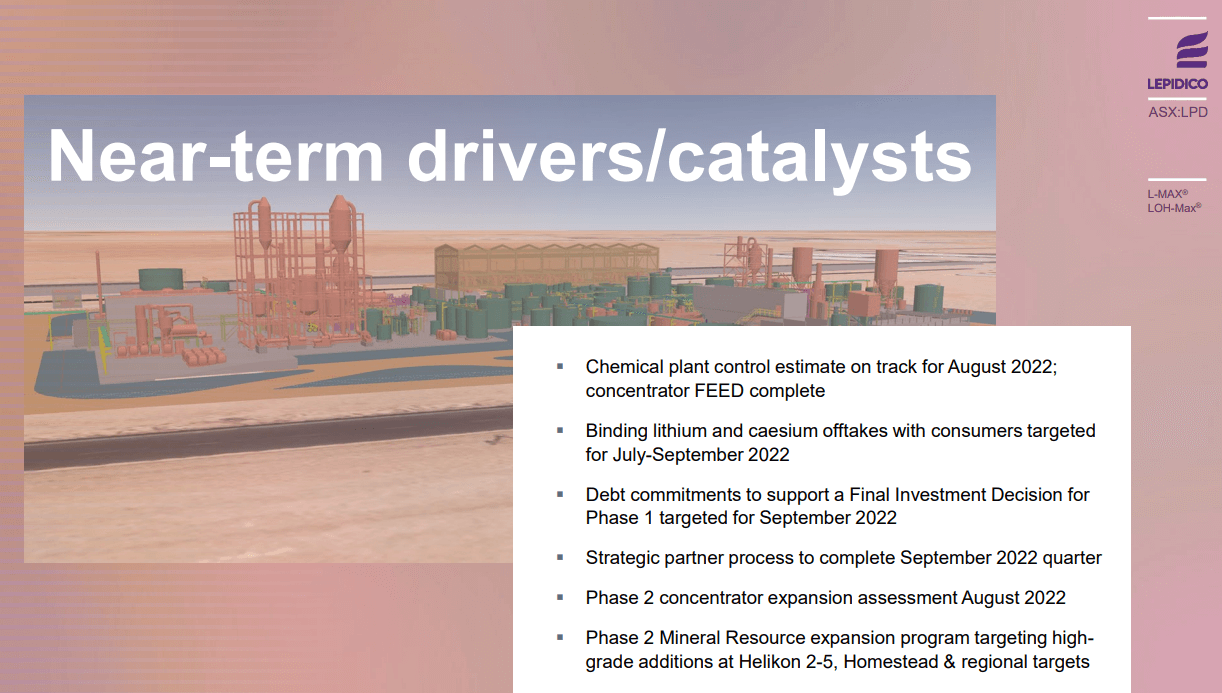
“I think we are still being valued as a developer, and the last piece of the puzzle for us, because we've got most of those pieces already in place now, is to get visibility on the financing. There are plenty of references out there that would suggest that once there's some granularity around that piece, as long as there aren't other obstacles like permitting, etc, which we've already addressed, then there should be a re-rate.”
Lepidico Ltd. plans to initiate production at the Phase 1 project by the second half of 2025. Walsh explains that the company is on track to meet the date, with its FEED works completed.
“2025. It's not too far away. We've now got the control schedule from the completion of front-end engineering and design last year, so we've got, I think, a very good handle on what the schedule looks like for this implementation phase of the project. We're looking at mid-2025 for that.”
Walsh explains that the ESG components of the Phase 1 project play an important part in obtaining the required funds. A major factor when speaking to any lender or strategic investor is, what the environmental and social credentials of the project look like. He explains that the UAE is actively developing greener forms of energy and that when the country implements its green hydrogen power generation initiatives, The Phase 1 project of Lepidico Ltd. will in all probability be one of the greenest operations in the world.
“I think our business can demonstrate that we've got exceptional credentials in that regard. Also, the jurisdictions in which we're operating support that. The UAE, particularly Abu Dhabi, is very aggressive in developing commercial green hydrogen for example. That will take our greenhouse gas emissions from maybe 25% lower than the typical integrated spodumene project down to probably best in industry, down to around 3t/t.”
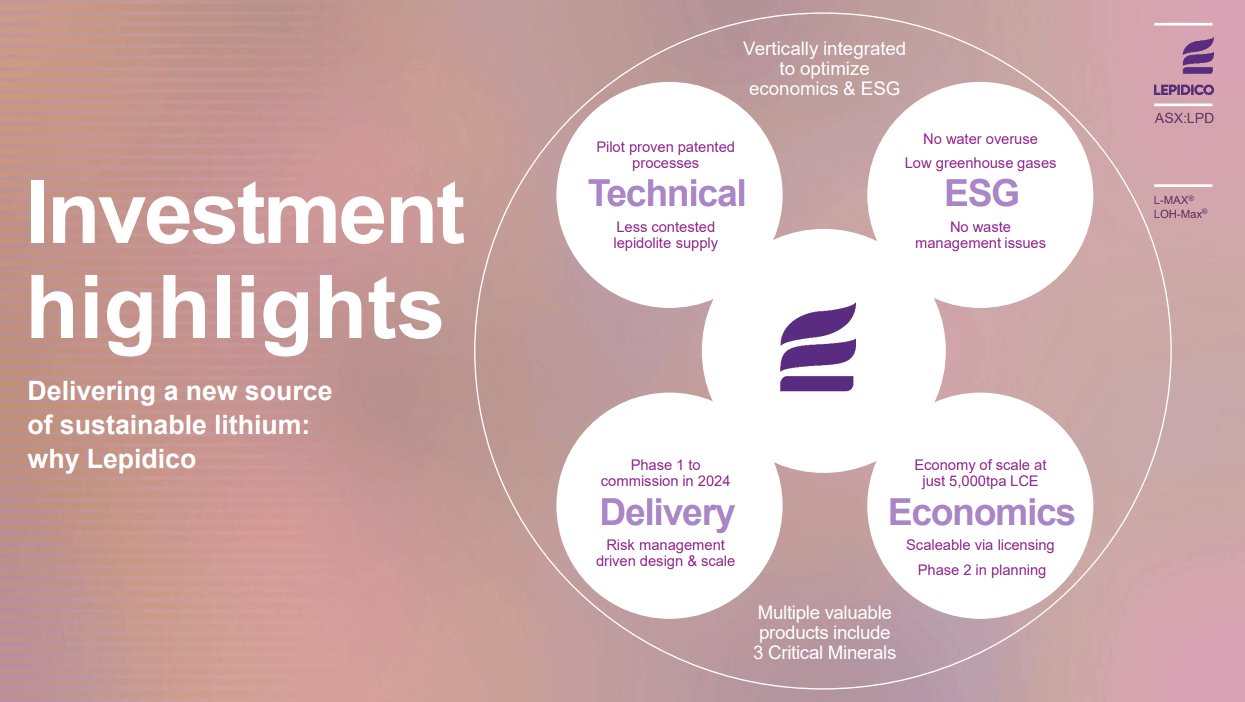
To find out more, go to the Lepidico website
Analyst's Notes




Subscribe to Our Channel
Stay Informed













